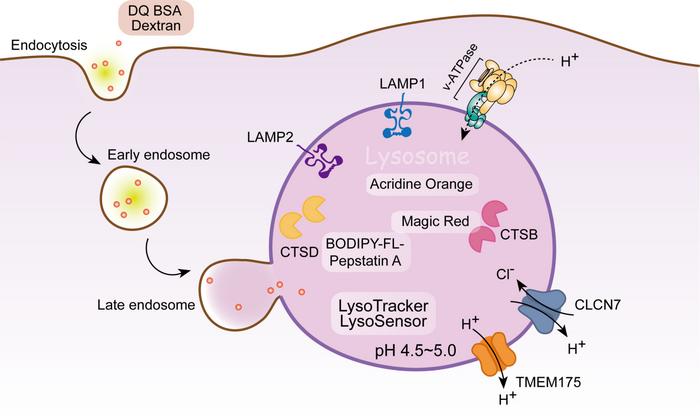Lysosomes are critical for cellular degradation, characterized by their acidic pH and array of hydrolytic enzymes. They degrade materials through endocytosis, phagocytosis, and autophagy, recycling essential components. Lysosomes also participate in vital cellular processes, and their dysfunction contributes to diseases such as lysosomal storage diseases, neurodegenerative disorders, and cancer. Research methods and tools have been developed to study lysosomes in cultured cells, C. elegans, and mice, key model systems. In cultured cells, lysosomes can be characterized and their functions investigated. C. elegans, with its short life cycle and genetic tools, offers a straightforward model for studying lysosomes in development and aging. In mice, transgenic models expressing lysosomal proteins provide insights into lysosomal function in vivo. While the well-established tools will continue to contribute to the study of lysosomal biology, it is necessary to develop novel assays for a better understanding of lysosomal functions in diverse physiological and pathological conditions. The methods and techniques summarized in this review provide a foundation for understanding lysosomal biology and exploring potential therapeutic targets. The review entitled “Exploring lysosomal biology: current approaches and methods” was published on Biophysics Reports (published on January, 2024).

Credit: Qiuyuan Yin,Chonglin Yang
Lysosomes are critical for cellular degradation, characterized by their acidic pH and array of hydrolytic enzymes. They degrade materials through endocytosis, phagocytosis, and autophagy, recycling essential components. Lysosomes also participate in vital cellular processes, and their dysfunction contributes to diseases such as lysosomal storage diseases, neurodegenerative disorders, and cancer. Research methods and tools have been developed to study lysosomes in cultured cells, C. elegans, and mice, key model systems. In cultured cells, lysosomes can be characterized and their functions investigated. C. elegans, with its short life cycle and genetic tools, offers a straightforward model for studying lysosomes in development and aging. In mice, transgenic models expressing lysosomal proteins provide insights into lysosomal function in vivo. While the well-established tools will continue to contribute to the study of lysosomal biology, it is necessary to develop novel assays for a better understanding of lysosomal functions in diverse physiological and pathological conditions. The methods and techniques summarized in this review provide a foundation for understanding lysosomal biology and exploring potential therapeutic targets. The review entitled “Exploring lysosomal biology: current approaches and methods” was published on Biophysics Reports (published on January, 2024).
Journal
Biophysics Reports
DOI
10.52601/bpr.2023.230028
Method of Research
Experimental study
Subject of Research
Cells
Article Title
Exploring lysosomal biology: current approaches and methods
Article Publication Date
1-Jan-2024




